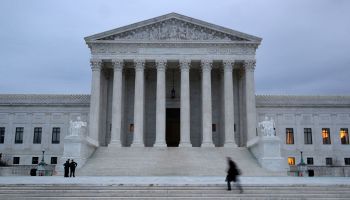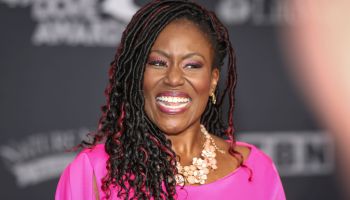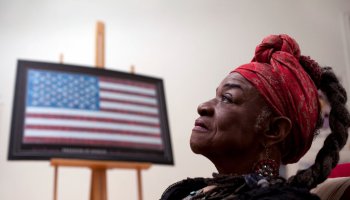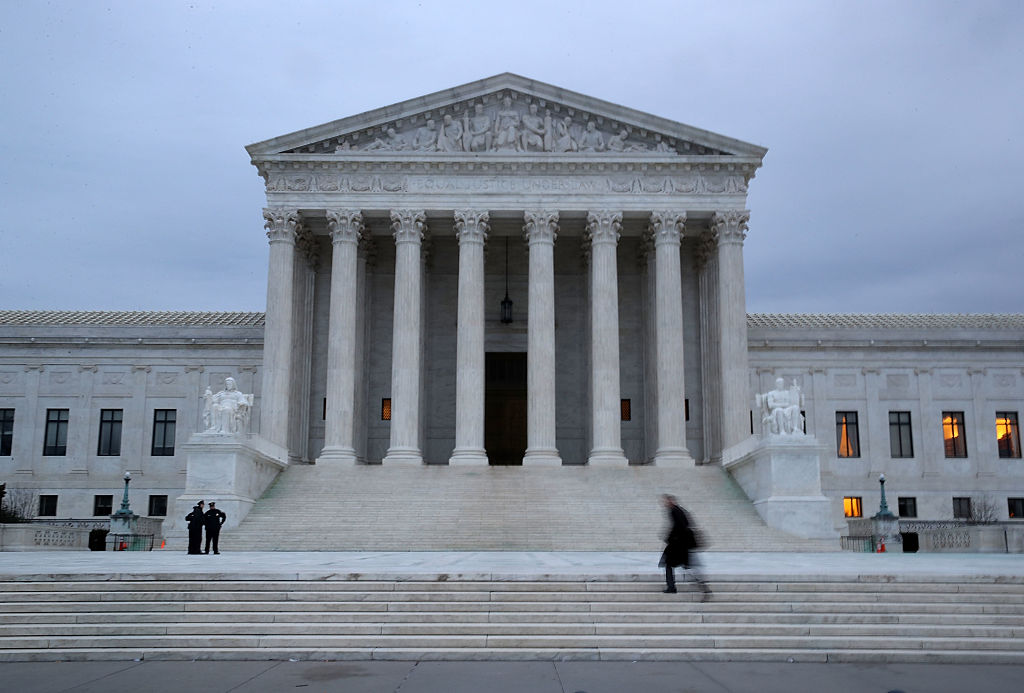
Source: Mark Wilson / Getty
UPDATED: 12:00 p.m. ET, Sept. 19 —
The legal and political worlds collided in spectacular fashion Friday after the death of Supreme Court Justice Ruth Bader Ginsburg was reported less than two months away from Election Day. As Democratic presidential nominee Joe Biden expressed his condolences for the loss of Ginsburg, long the Court’s liberal bastion, the president was busy announcing his intentions to move swiftly to fill her spot.
All of the above has amounted to a looming political battle expected to be drawn along Party lines in a situation that nearly mirrors one from four years ago following the death of Associate Supreme Court Justice Antonin Scalia in February of 2016 — nine months before Election Day that year. In that case, though, then-President Barack Obama‘s nomination of Merrick Garland descended into political purgatory as Republicans refused to participate in the process, leaving the Supreme Court vacancy unfilled until the Republican-led Senate Judiciary Committee confirmed Neil Gorsuch, who Donald Trump successfully nominated. (Trump also got Brett Kavanaugh confirmed to the Supreme Court last year.)
This time around, Trump is trying to move way quicker than Obama did, likey prompting Democrats to put up a fight. But Republicans have the majority in the Senate, rendering Democrats seemingly powerless in any attempt to prevent Trump from filling Ginsburg’s seat “without delay,” as he tweeted Saturday morning.
And if Trump’s history of appointing and nominating judges is any indication, he does not have a single Black woman judge on his radar. But Biden has vowed to “appoint the first Black woman to the courts” because, he said during a Democratic debate in March, “It’s required that they have representation now. It’s long overdue.”
It is in that context that you can check out the following five Black women candidates who could be in consideration from a Biden administration — an administration that can only be if people vote.
Sherrilyn Ifill, 57
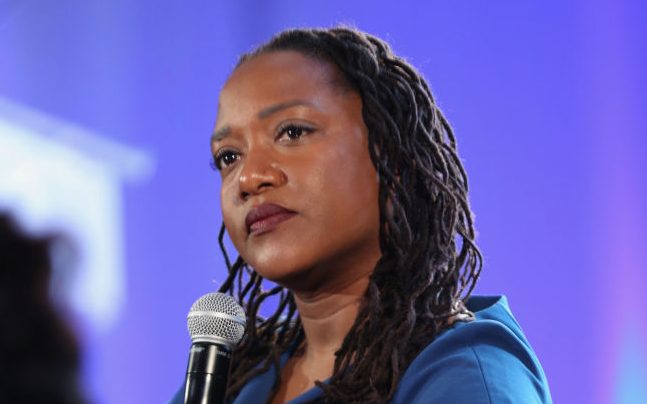
Source: Robin L Marshall / Getty
Ifill is the current President and Director-Counsel of the NAACP Legal Defense and Educational Fund (LDF), which fights for racial justice and equality.
According to the LDF website, Ifill began her career as a Fellow at the American Civil Liberties Union before she joined the LDF staff as an Assistant Counsel. It was here that she litigated voting rights cases for five years. Considering the U.S. Supreme Court gutted the Voting Rights Act in 2013 leading to major voter suppression across states, having someone like Ifill could help reconcile some of the backtrackings in American civil rights.
Ifill also pioneered a series of law clinics while being a faculty member at the University of Maryland School of Law in Baltimore. She even helped develop one of the earliest law clinics in the country focused on challenging legal barriers to the reentry of ex-offenders. With Biden pushing criminal justice reform, Ifill can be just the right candidate to push the cause.
When Ifill was invited back to LDF as the organizations seventh Director-Counsel, she continued to lead their cause of “fighting voter suppression, inequity in education, and racial discrimination in application of the death penalty.”
Judge Ketanji Brown Jackson, 49
Jackson was on former President Barack Obama‘s shortlist to replace Supreme Court Associate Justice Antonin Scalia when he died in 2016. She was nominated to the U.S. District Court for the District of Columbia by Obama back in 2012.
According to NBC News, Jackson is “a former appellate lawyer in the private sector, federal public defender who handled appeals, clerk to Associate Justice of the Supreme Court Stephen Breyer, staff lawyer and later Obama-appointed member of the U.S. Sentencing Commission, Jackson is accustomed to deciding big matters.”
Someone like her will readily take on Trump considering in 2018, she ruled that Trump overstepped his authority as the president in an order restricting the ability of federal employees to collectively bargain. Jackson also has a promising record when it comes to health and wellness. In a 2013 case, meatpackers tried to block Obama administration regulations requiring labels to identify an animal’s country of origin. Jackson upheld the rule to which the meatpackers appealed and lost.
Justice Leondra Kruger, 43
Kruger is the youngest California Supreme Court justice in modern history and the fourth Black person. According to the Los Angeles Times, she is more likely than her Democratic colleagues to vote with Republican appointees due to her “inherently lawyerly caution,” avoiding sharp shifts in the law, said Kirk C. Jenkins, an appellate lawyer who studies and writes about the court.
The Times continued, “Colleagues describe her as meticulous, hewing to the precise text of laws and ruling as narrowly as possible out of concern that a result in one case could have unintended consequences in another.”
UC Berkley law school dean Erwin Chemerinsky described her as “more conservative” in criminal cases than fellow Democrat California Supreme Court justices Tino Cuellar and Goodwin Liu. However, she has leaned more to the left when it comes to certain issues. For example, Cuellar wrote a majority decision upholding a death penalty verdict and sentence, however, Kruger dissented. Biden opposes the death penalty.
Kruger also spent several years as a lawyer in the U.S. solicitor general’s office, representing the views of the Obama administration in criminal and civil cases before the U.S. Supreme Court. Such a background could align her with Biden.
Melissa Murray, 52
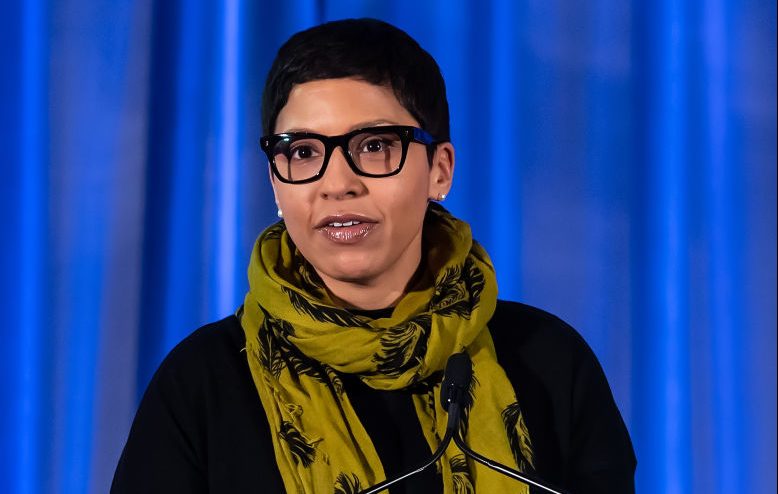
Source: Gilbert Carrasquillo / Getty
This NYU Law professor is a leading expert in constitutional law, family law and reproductive rights and justice. Her research has made an impactful contribution to the study of legal regulations on intimate life, encompassing topics like the regulation of sex and sexuality, marriage and its alternatives, the legal recognition of caregiving and reproductive rights and justice.
She has spoken about and advocated for reproductive justice and LGBT rights from a legal perspective throughout interviews and articles. She also opposed alleged sexual harasser and voter suppressor Brett Kavanaugh‘s appointment to the Supreme Court, saying his confirmation would “threaten people’s ability to make fundamental personal decisions, including whether to have an abortion.”
Having someone like this in the Supreme Court could help challenge the mostly conservative line-up.
Michelle Alexander, 52
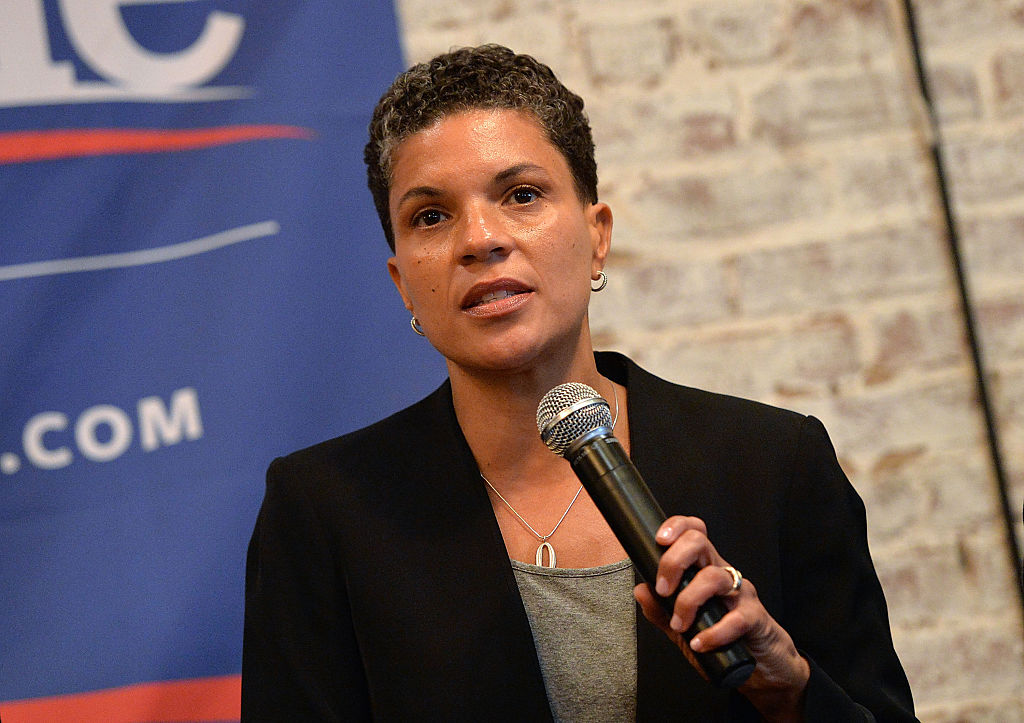
Source: Slaven Vlasic / Getty
Probably the most radical of the bunch when it comes to criminal justice, Alexander first reached prominence via her largely impactful book, “The New Jim Crow” which broke down the devastating impact of the “war on drugs” and its relationship to mass incarceration. Since the book was released in 2010, Alexander has taken a more radical approach to mass incarceration by joining comrades like Angela Davis and Marc Lamont Hill in believing prisons should be abolished. “I think prisons are absolutely obsolete,” Alexander explained in a New Yorker interview. “I hope that one day our nation will look back on this practice of putting human beings in literal cages, often treating them worse than we would treat a dog at the pound, sometimes locking them in solitary confinement for decades, allowing them little or no access to sunshine or human contact—I hope that one day we will look back on this practice with as much shame and horror as we view the practice of slavery, or the practice of cutting off limbs and hands of thieves.”
Abolition talk is not far-fetched, considering Biden has advocated for the abolition of cash bail during their campaign, which would play a major role in curtailing mass incarceration. Considering their stance on this issue, the two could be open to considering Alexander, a civil rights lawyer and legal scholar with abolition politics. Such a justice with far-leftist ideas could definitely impact criminal justice cases in the conservative-leaning Supreme Court.
SEE ALSO:
Examining Justice Ruth Bader Ginsburg’s Complicated Legacy On Race
Who Will Be The Next Supreme Court Nominee? Another Issue Black Voters Must Stay On Top Of
5 Black Women To Consider For Next Supreme Court Justice was originally published on newsone.com








